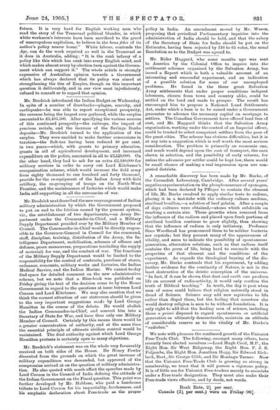Mr. Brodrick introduced the Indian Budget on Wednesday. In spite
of a number of drawbacks—plague, scarcity, and earthquake—he was able to report exceptional prosperity, the revenue being the largest ever gathered, while the surplus amounted to B3,485,500. After specifying the various sources of this continued prosperity—the railways, the import of precious metals, and the increase of the Savings Banks deposits—Mr. Brodrick turned to the application of the surplus. They were enabled to make further concessions in taxation—the Salt-tax having been reduced 40 per cent. in two years—which, with grants to primary education, grants in aid of agricultural development, and increased expenditure on the police, amounted in all to £3,120,000. On the other hand, they had to ask for an extra £2,440,000 for military services in order to carry out Lord Kitchener's reorganisation scheme, which would increase the field army from eighty thousand to one hundred and forty thousand, provide for the re-equipment of the Indian Army with field artillery, the re-grouping of troops on the North-West Frontier, and the maintenance of factories which would make India self-supporting in all the necessaries of war.


















































 Previous page
Previous page